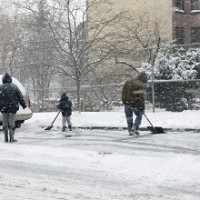The Worst Winter in Decades

2014: The Worst Winter in Decades
2014 featured one of the worst and most extreme winters North America has felt in decades. The United States’ eastern seaboard suffered under very cold temperatures for the majority of the season, and was hit by a succession of winter storms and blizzards almost from the very start of the season.
North American Cold Wave
Temperatures began to dip well below freezing during the month of January which has since become known as the 2014 North American Cold Wave. It affected much of Canada, the United States’ eastern seaboard and Northern Mexico. An Arctic front accompanied by a nor’easter storm tracked across the country on January 2nd and brought heavy snowfall and bitterly cold temperatures.
This event was caused by a sudden stratospheric warming, causing the breakdown of the polar vortex and leading it to track southward bringing Arctic air into the region. The polar vortex continued to track cold air into the United States well into early March. Record temperatures were recorded right across the country, with temperatures such as -18 F in Green Bay, Wisconsin and -37 F in Babbitt, Minnesota.
This extended cold snap caused the Great Lakes to freeze up to 98%. The resulting melting period didn’t happen until temperatures rose above the freezing mark near the end of February, into early March.
Heavy Snowfall
2014 brought with it more snow than has been seen in the United States in recent years; and actually will go down in history as being the second snowiest winter ever; it is short of the record by only 1.7”. For evidence of this, Fort Wayne, Indiana had an accumulated snowfall of 61.1” by February 20. The average city in the United States saw more snow days per month than in previous seasons since 1974.
There were more snowstorms this year too; with New York seeing 14 storms pass through, leaving approximately 4 feet of snow in their wake. Boston has seen 53.5” of snow, although it’s not that far of its average and Chicago saw 67.9” of snow this season and saw its fifth snowiest winter since 1884.
Experts believe this is a possible trend toward colder and snowier winter seasons, and drier and potentially hotter summers. They do believe the mere fact of the Great Lakes’ almost complete freeze will affect the coming summer, bringing with it cooler, less humid days.

